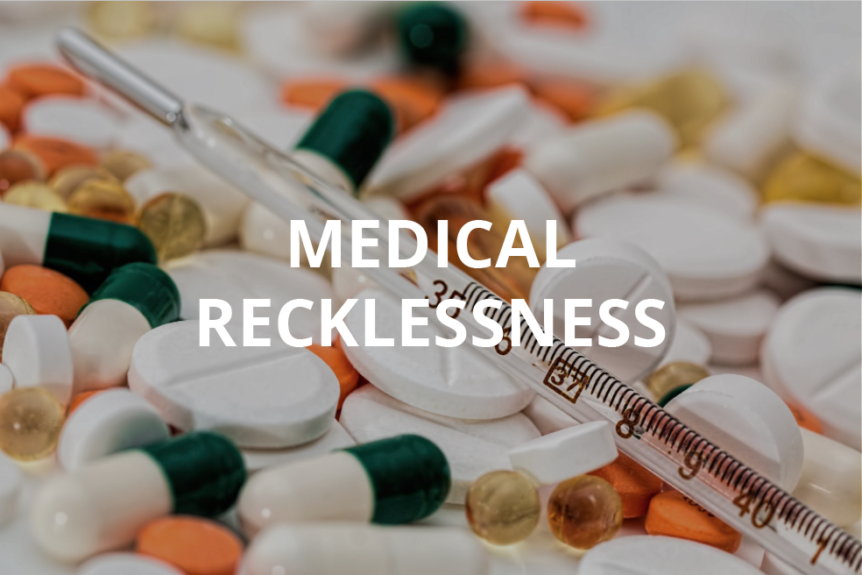When it comes to law in the medical field, people are often most familiar with medical malpractice- a case in which negligent actions led to injury or suffering. In reality, however there are many more nuanced and potentially more malicious cases in regards to treatment, discharge and continuing care. In this article we will touch on “Recklessness” and what it means in the medical field.
Recklessness & Medical Malpractice
Although medical malpractice most commonly is associated with inattention or carelessness on the part of doctors and other health care professionals, the term also includes reckless or intentional misconduct, ranging from discharging a patient prematurely for financial reasons to performing surgery for which the patient has not consented to sexual assault on unconscious patients.
If the victims of such conduct or inaction are able to prove that the provider’s wrongdoing caused their injuries, they will be entitled to a money award to compensate them for what they have lost as a result. Many attorneys will accept such cases on a “contingency fee basis,” that is, taking fees only out of the money they win for you.
This area of law is complex and difficult for injured patients because of numerous technical advantages held by the providers (and their insurance companies). It is therefore particularly important in medical malpractice cases to find an excellent attorney to represent you. It is also important to do so promptly because there are severe (and often arbitrary) time limits on when
Information provided by: https://bestlawfirms.usnews.com/medical-malpractice-law-plaintiffs/overview
To commit a criminal offence of ordinary liability (as opposed to strict liability) the prosecution must show both mens rea and actus reus. A person cannot be guilty of an offence for his actions alone; there must also be the requisite intention, knowledge, recklessness, or criminal negligence at the relevant time.
Criminal law recognizes recklessness as the second of the four main classes of mental state constituting mens rea elements to establish liability, namely:
* Intention: intending the action; foreseeing the result; desiring the result.
* Recklessness: intending the action; foreseeing the result; NOT desiring the result but continuing anyway, with “reckless disregard”.
* Carelessness: intending the action but failing to take care; carelessly failing to foresee the result; NOT desiring the result.
* Innocence: being without blame (and possibly not even an actor in the acts reus).
Intention and recklessness both provide sufficient mens rea for a criminal conviction. Recklessness shows less culpability than intention, but more culpability than criminal negligence. Carelessness is not normally criminal, except in specific offences as “driving without due care and attention”. Innocence will lead to liability only for crimes of strict liability.
The tests for any mens rea element relies on an assessment of whether the accused had foresight of the prohibited consequences and desired to cause those consequences to occur. The three types of test are:
1. subjective where the court attempts to establish what the accused was actually thinking at the time the actus reus was caused;
2. objective where the court imputes mens rea elements on the basis that a reasonable person with the same general knowledge and abilities as the accused would have had those elements, (although R v Gemmell and Richards deprecated this in the UK); or
3. hybrid, i.e. the test is both subjective and objective.
Information provide by: https://en.wikipedia.org/wiki/Recklessness_(law)
What Damages Can You Recover?
If you establish that your early discharge amounts to medical malpractice, you may be able to recover the following as damages:
* Medical Bills – This will be limited to those bills which would not have been incurred were it not for your early discharge.
* Lost Earnings – If you missed work due to your early discharge, you may recover the amount of income you lost during that time.
* Lost Ability to Earn an Income – If you cannot engage in certain work activities because of the harm caused by your early discharge, you may be able to receive compensation for this measurable monetary loss.
* Pain and Suffering – There is no hard and fast rule for determining what this amount will be, but it will be based in part on the severity and permanency of the harm you suffered as a result of your early discharge.
Personal Injury Lawyers You Can Trust
If you or a loved one has been injured due to the negligence of a medical professional, you may have a case to file a claim for medical malpractice. At Nutt Law Office, we’re dedicated to collecting the facts of your case, as well as any physical evidence of negligence to make sure you receive the compensation you deserve.
When you contact Nutt Law Office, we’ll provide you with a free initial consultation to discuss your case. We never collect a fee unless we successfully resolve your case!

